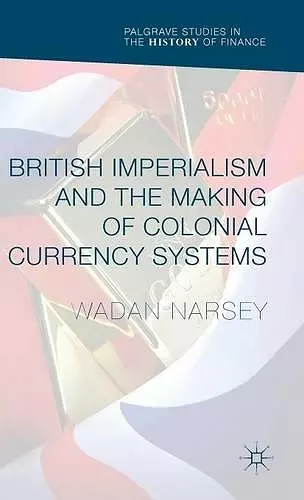British Imperialism and the Making of Colonial Currency Systems
Format:Hardback
Publisher:Palgrave Macmillan
Published:8th Apr '16
Currently unavailable, and unfortunately no date known when it will be back

Narsey offers us an original and pioneering investigation of how the British state regulated gold, silver and paper as media of exchange, debt, and savings in colonies, from simple management of coinage to the emergence of the currency board, to become a critical part and the heart of the British Empire. Appearing in the fascinating story are privateers in the eighteenth-century West Indies with gold standards based on the slave economy and contraband from the Spanish main, Keynes's work on the currency of the Raj, and twentieth-century debates about the colonial money supply and economic development. The common theme is that the economic interests of metropolitan Britain were almost always given primacy in the administration of colonial money. The book is a valuable addition to the economic history of both the British empire and of globalization.' - Professor Richard Drayton, Rhodes Professor of Imperial History, Kings College, London 'Based on extensive archival research, Professor Narsey shows that imperial priorities took precedence over native desires for economic development in dependent colonies throughout the history of the British Empire. This was an undesirable, but fully intended, consequence of imperial financial innovations in the British colonies, including the currency boards of Hong Kong and Singapore whose later success came only when British political control was lifted.' - Professor Larry Neal, Professor Emeritus of Economics, University of Illinois at Urbana-Champaign 'This is an important contribution to the growing body of knowledge on the history of colonial currency systems.' - Chibuike Uche, Senior Researcher, African Studies Centre, Leiden
Wadan Narsey explores how Great Britain sustained financial supremacy in the international economy in the latter part of the nineteenth century, while also maintaining its commitment to keeping the pound sterling fully convertible to a fixed amount of gold.Based on archival research covering more than two centuries and most former British colonies (West Indies, India, Singapore, Malaya, West Africa and East Africa), this book is a revisionist history of the British imperial manipulations of colonial currency systems to facilitate the rise of sterling to world supremacy via the gold standard, and to slow its eventual decline after World War II.
Britain forcibly replaced international currencies, including gold and sterling itself, by new localised silver currencies, backed by gold and sterling reserves in London, under the total control of the British Treasury and the powerful influence of the Bank of England.
Ignoring colonial needs, imperial decision-makers continuously over-ruled colonial governments, commercial interest in colonies (British and local), Colonial Office and the Crown Agents, to support liquidity in the London Money Market, convertibility of sterling, export of British capital, and cheap readily available finance for the British Government. Academia, including Keynes and institutions like the London School of Economics, are shown to have played supporting roles.
This book is valuable reading for academics and students interested in theories of imperialism, colonial underdevelopment, money (national and international) and related topics such as currency areas and exchange rates. Its comprehensive index links monetary concepts to actual events in the British Empire, with pointers to new research areas.
This account of the rise and fall of sterling as a world currency may have lessons for the future trajectories of the US dollar, Euro, Chinese renminbi and the Indian rupee.
Narsey offers us an original and pioneering investigation of how the British state regulated gold, silver and paper as media of exchange, debt, and savings in colonies, from simple management of coinage to the emergence of the currency board, to become a critical part and the heart of the British Empire. Appearing in the fascinating story are privateers in the eighteenth-century West Indies with gold standards based on the slave economy and contraband from the Spanish main, Keynes's work on the currency of the Raj, and twentieth-century debates about the colonial money supply and economic development. The common theme is that the economic interests of metropolitan Britain were almost always given primacy in the administration of colonial money. The book is a valuable addition to the economic history of both the British empire and of globalization.'
- Professor Richard Drayton, Rhodes Professor of Imperial History, Kings College, London
'Based on extensive archival research, Professor Narsey shows that imperial priorities took precedence over native desires for economic development in dependent colonies throughout the history of the British Empire. This was an undesirable, but fully intended, consequence of imperial financial innovations in the British colonies, including the currency boards of Hong Kong and Singapore whose later success came only when British political control was lifted.'
- Professor Larry Neal, Professor Emeritus of Economics, University of Illinois at Urbana-Champaign
'This is an important contribution to the growing body of knowledge on the history of colonial currency systems.'
- Chibuike Uche, Senior Researcher, African Studies Centre, Leiden
ISBN: 9781137553171
Dimensions: unknown
Weight: 606g
356 pages
1st ed. 2016